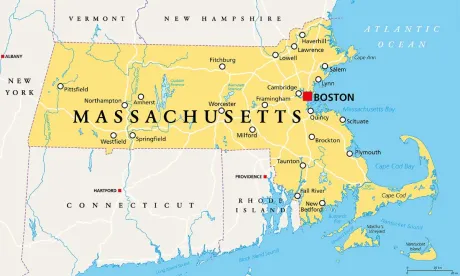The Massachusetts Department of Family and Medical Leave has answered a question that employers in the Commonwealth have been struggling with in recent months concerning possible changes to the Paid Family and Medical Leave (PFML) Act.
As we have previously reported, qualifying Massachusetts employees are now eligible to receive partial wage-replacement benefits during leave taken to deal with a personal health crisis, bond with a child, care for a sick relative or covered service member, or manage an emergency arising from a family member on active duty. The benefit amount, which varies based on income, is currently capped at $1,084.32 per week.
Since the law was originally promulgated back in January of 2021, employees receiving PFML benefits have been barred from using accrued paid leave (e.g., their sick, vacation, and/or personal time) to supplement wage-replacement benefits received through the Department of Family and Medical Leave (the “Department”).
Recent visitors to the Department’s website may therefore have been surprised to see the following message, posted on August 9, 2022:
DFML has recently received a number of inquiries as to whether employees are permitted to use their accrued sick or vacation leave to “top off” their weekly PFML benefit. Please be advised that there has been no change to the DFML law. Employees may not use their accrued sick or vacation leave in weeks that they are receiving benefits from DFML.
The message seems to be in response to recent actions taken by the Massachusetts legislature and Governor Charlie Baker with respect to the budget for Fiscal Year 2023.
In July of this year, some reports indicated that Massachusetts had enacted a budget which included a major amendment to the PFML Act – namely, that beginning in 2023, employees would have the option to use paid leave accrued through their employer to “top off” benefits received from the Department. In theory, this would allow employees to take home their full standard weekly wages while on PFML-approved leave. The new law would have gone into effect retroactively as of July 1, 2022.
Now, however, the Department has clarified that no such change is on the immediate horizon. Rather, the confusion likely arose as a result of numerous legislative steps implicated in finalizing the Commonwealth’s budget.
In the budget proposal that originally crossed Governor Baker’s desk, the PFML statutory scheme was amended to state that any weekly benefit amount received from the Department would not be reduced by “any accrued sick or vacation pay or other paid leave provided under an employer policy,” unless the aggregate amount an employee was to receive would exceed that employee’s average weekly wage.
Governor Baker vetoed that proposal and returned the bill to the legislative branch with suggestions for amendment on July 28, 2022. In an explanatory letter, Baker suggested that requiring employers to calculate the difference between an employee’s PFML benefits from the Department and their normal average weekly wage would be an administrative burden neither employers nor the Department are prepared to handle – particularly in light of the fact that “erroneous overpayments” by employers are already a significant challenge. Moreover, Baker explained that permitting employees to supplement benefits with accrued paid leave would further strain the PFML program by incentivizing employees to take leave more frequently. He suggested striking out the language that had been proposed by the legislature and replacing it with a provision requiring the Department to conduct a study that would evaluate the benefits, disadvantages, and associated implementation costs of the suggested changes to the law.
Response from the Massachusetts House of Representatives was swift. The following day, 126 out of 153 participating members voted to reject Baker’s recommendation, thereby sending the bill to the Senate for further vote. Importantly, in Massachusetts, a gubernatorial veto may be overridden by a two-thirds vote in both the House and the Senate. However, the Senate failed to act before adjourning for the summer, meaning that the veto has not been overridden.
Thus, as the Department indicated, there has been no change to the PFML law as of yet. Massachusetts employees must therefore continue to choose between using paid leave accrued through their employer and receiving partial wage-replacement benefits from the Department.
Employers across all states should be mindful of updates to the Massachusetts PFML law and associated regulations, as an increasing number of states are implementing similar laws.




 />i
/>i

